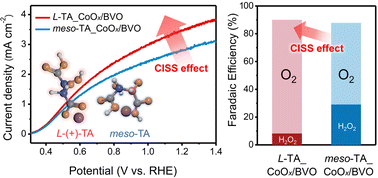Elucidating the chirality transfer mechanisms during enantioselective synthesis for the spin-controlled oxygen evolution reaction†
Abstract
Due to their intrinsic spin control capability and excellent catalytic activity, chiral inorganic materials have been recognized as promising candidates for achieving a breakthrough in the solar-to-hydrogen conversion efficiency of water-splitting devices. However, a rational design for these materials for use in photoelectrochemical water-splitting is still lacking because of an incomplete understanding of chirality transfer phenomena. In the present study, we first investigated these phenomena at the molecular level. Through in-depth conformational analysis using liquid-state spectroscopy, we confirmed that chiral ligand molecules exhibit direction-dependent dimer interactions even in the precursor solution, which significantly affect the degree of chirality transfer and the quality of chiral inorganic materials. Based on this understanding of chirality transfer phenomena, we successfully fabricated a chiral inorganic material-based water-splitting device that shows an outstanding performance in terms of the oxygen evolution reaction. Our study thus demonstrates the great potential of chirality-induced spin-selectivity phenomena in the water-splitting process.



 Please wait while we load your content...
Please wait while we load your content...